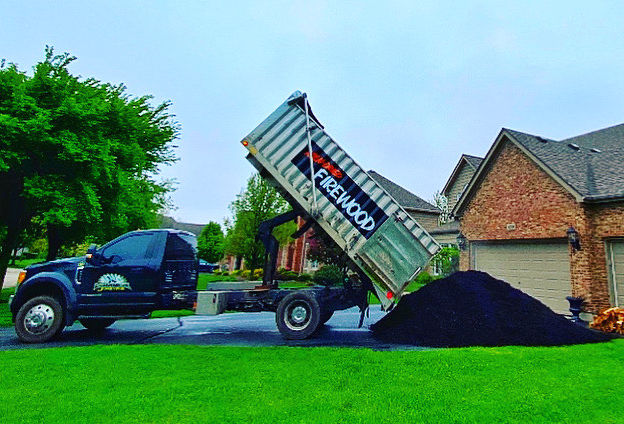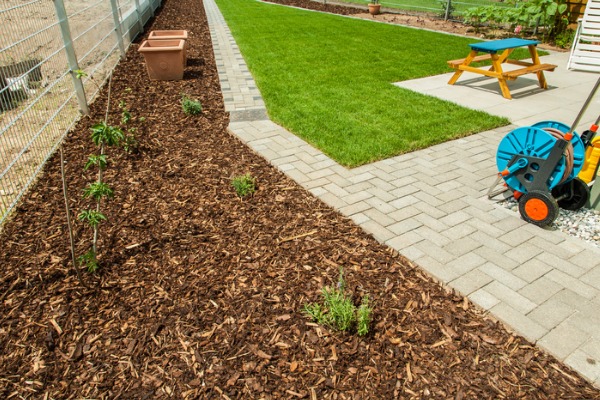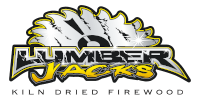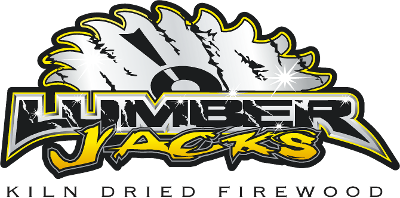The time has come to lay down some new wood mulch. Awesome! Your landscape plots and flower beds will look glorious clothed in that new layer of weed-suppressing, soil-enriching goodness! But wait… have you decided what types of mulch you will use yet?
There are many different types of mulch to choose from, and the kind of mulch you choose will make a huge difference. With so many options, it can feel overwhelming to determine the best choice for your outdoor space.
But don’t sweat it! We’re here to help with an overview of popular mulches and the advantages and disadvantages of each. Keep reading, and you’ll be ready to get to work with your ideal type of mulch in no time!
Hardwood Bark Mulch
Hardwood bark mulch is the most popular type of organic mulch on the market. It consists of pieces of aged bark from hardwood trees, such as oak, hickory, ash or maple trees.
Advantages of Hardwood Bark Mulch
An undeniable benefit of hardwood bark mulch is how great it looks. The irregularly sized pieces can give landscape beds a natural and pleasing appearance. Unlike some mulches, that attractive appearance won’t fade quickly over time.
Hardwood bark mulch also works wonders for the soil. It’s excellent at conserving water as it protects the soil against evaporation. The mulch also helps aerate the soil by allowing air to flow through it easily.
Another great thing about hardwood bark mulch is how easy it is to find. It’s one of the most common mulches on the market today and is relatively inexpensive compared to other groundcover options.
Disadvantages of Hardwood Bark Mulch
While hardwood bark mulch is a great all-purpose mulch, it can have drawbacks. For example, if you have plants that thrive in acidic soil, hardwood bark mulch can be a problem since it turns the soil alkaline as it decomposes.
Hardwood bark mulch can also attract termites and other pests since it forms a barrier over the moist soil. Termites can congregate in that environment and, if the mulch is near the foundation of a house, can make their way into the home. Therefore, it’s a good idea to take precautions when laying this type of mulch to avoid termite problems.
We should also note that hardwood bark mulch and many other types of wood mulch on this list can be a fire hazard. Of course, the severity of this risk depends on where you live. For example, if you live in an area prone to wildfires like California, the fire risk is much more of a factor than for a homeowner in the Midwest.
Shredded Hardwood
While hardwood bark mulch consists of large nuggets of bark, shredded hardwood is made of thinner, smaller strands.
Advantages of Shredded Hardwood
Shredded hardwood is even better at trapping moisture than hardwood bark mulch. It also decays faster and adds more nutrients to the soil as it does.
The shredded pieces hold together better than the large pieces of bark. As a result, they are better for laying in sloped areas because they won’t roll away. Plus, they’re less likely to float off in a rainstorm.
If you find shredded hardwood the best option for your outdoor space, you’ll need less of it to cover your ground compared to alternatives. This is because shredded mulch will lay heavier on the soil and more thoroughly cover the ground with less bulk.
Disadvantages of Shredded Hardwood
One of the drawbacks of how well pieces of shredded hardwood hold together is they can tend to compact over time. This compaction can make it harder for necessary nutrients to get to the soil through the mulch layer.
Although there may be cost benefits associated with needing less shredded hardwood mulch, it may also require more work. The compaction possibility means you may want to remove the previous year’s mulch (at least in part) before laying new. On the other hand, bark types of mulch generally don’t require this.
Like hardwood bark mulch, shredded hardwood is also harmful to acidic plants, can attract pests and be a fire risk in drier climates.

Pine Bark Mulch
Pine bark mulch is a lightweight mulch most often derived from pine trees. However, it can also consist of pieces from softwood trees like firs and spruces. It comes in various sizes and textures, including shredded pieces or nuggets.
Advantages of Pine Bark Mulch
Pine bark mulch costs less than many other organic options. It’s also very easy to apply because of its low weight.
While it does tend to decompose quicker than hardwood, pine bark mulch is still long-lasting. This type of mulch adds a lot of valuable nutrients to the soil as it decomposes and is exceptionally nutritious for plants that thrive in acidic environments.
Disadvantages of Pine Bark Mulch
When compared to the other organic options, pine bark mulch isn’t quite as aesthetically appealing. Its dark brown color looks fine, but it’s certainly not as striking as the appearance of cedar or red-colored mulches.
Pine bark mulch also trails hardwood bark mulch when it comes to moisture retention in the soil. The lightweight wood can’t quite hold in the moisture as well as heavier hardwood.
Another effect of its low weight is that pine bark mulch is prone to floating away in rainstorms. The mulch also has a hard time staying in place on steeper inclines.
Cedar Mulch
Cedar mulch consists of reddish-brown pieces of wood from cedar trees. The pieces can vary in size and have a distinct earthy wood aroma many homeowners find pleasing.
Advantages of Cedar Mulch
The two most significant benefits of cedar mulch are its aesthetic appeal and its knack for repelling pests.
There’s no denying cedar mulch both looks and smells great. Its reddish-brown appearance is the perfect accent for any backyard. And its woodsy smell makes for a delightful outdoor experience.
The mulch also does a great job of repelling harmful pests, such as termites. The insects can’t stand the aroma of cedar mulch, so they flee from it.
Disadvantages of Cedar Mulch
Because of its premium aesthetic qualities, cedar mulch tends to be on the pricier side. However, its excellent appearance and smell wear off quickly. In fact, the wood loses its attractiveness long before it decomposes. Plus, cedar mulch doesn’t add many nutrients to the soil during decomposition. So, it’s much more valuable in the short term than in the long term.
Even in the short term, cedar mulch has its drawbacks. While its insect-repelling is suitable for pests like termites, the mulch can also drive away insects that help the soil, like ladybugs.
Red-Colored Mulch
Red-colored mulch typically consists of hardwood dyed red to give it a striking appearance. However, some red mulch also includes other types of wood, including chipped-up wood furniture or pallets.
Advantages of Red-Colored Mulch
Of course, the most significant benefit of red-colored mulch is its attractive color. The red provides a great contrast with the natural green of a backyard. And the color tends to stay vibrant longer than the color of undyed mulches.
One common concern with red-colored mulch is that it can harm the environment as it decomposes and sheds the red dye used to make it. The good news is the dye is environmentally friendly. Furthermore, the mulch is treated with iron oxide, which feeds the soil as the mulch decomposes.
Disadvantages of Red-Colored Mulch
The biggest problem with red-colored mulch is the inconsistent quality of the mulch itself. For the most part, the mulch is made from natural hardwood. However, some mulch companies can slip in pieces of demolished decks and old pallets. These unnatural pieces can add harmful things like arsenic to the soil. So, when buying red-colored mulch, make sure you’re purchasing 100% hardwood mulch from a reputable seller.
Because it is dyed, red-colored mulch also costs more than other types of organic mulch.

Whole Tree Chips
Whole tree chips are large chunks of wood made from the entire tree, not just the bark. This means the appearance and smell of this type of mulch can vary significantly from traditional varieties.
Advantages of Whole Tree Chips
Because the pieces of wood are large, whole tree chips have a longer lifespan than other organic mulches. Whole tree chips are also less expensive. Many homeowners enjoy that the entire tree is used, believing this to be more ethical. However, organic mulch from a responsible company like Lumberjacks is always ethically produced – so this isn’t always something to worry about!
Disadvantages of Whole Tree Chips
If you’re looking for more uniform pieces of mulch, this isn’t the mulch for you. Since whole tree chips are made from the entire tree, they come in various shapes and sizes. It’s still a great look, to be sure, but not as homogenous as the other types of mulch.
Certified Playground Mulch
This mulch type is unique because it’s specifically designed to be safe for children’s play areas. It consists of hardwood pieces that have been shredded to meet specific size and consistency requirements.
Advantages of Certified Playground Mulch
Wood mulch is a better option for playgrounds than inorganic options like rubber because it’s natural. Organic wood is better for the environment than rubber and doesn’t contaminate the soil.
Hardwood playground mulch is less expensive and easier to install than inorganic alternatives. This advantage can be particularly significant for families on a budget or communities developing expansive play areas.
Disadvantages of Certified Playground Mulch
The drawbacks of wood playground mulch include that it needs to be replaced more often than inorganic options. It can also cause splinters and doesn’t absorb falls quite as well as rubber mulch. Certified playground mulch is also lightweight and can float away in the rain.
Found Your Ideal Types of Mulch?
We hope this guide has helped you identify the type of wood mulch you’d like to use. If you’re looking for somewhere to buy that mulch, may we humbly suggest our own establishment?
At Lumberjacks, we offer premium wood mulch for pickup or delivery. You can stop by one of our locations in Woodstock, IL, or Lake in the Hills, IL, to load up curbside or call us to place a delivery order. We deliver throughout the Northern Illinois and Southern Wisconsin regions, including to cities like Schaumburg and many more!.
Please give us a call at 815-337-1451 to place your order! Or, if you would like to learn more about our premium mulch, you can read our comprehensive guide on the subject here.








